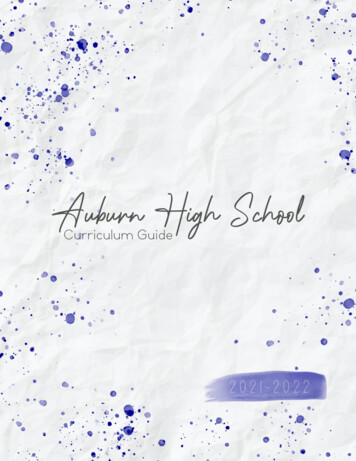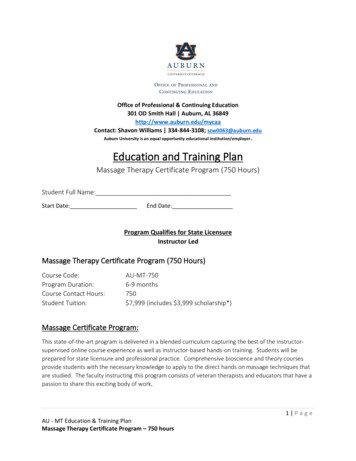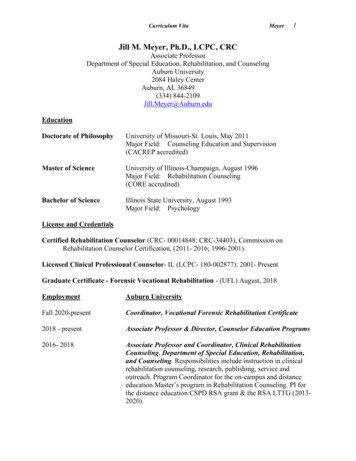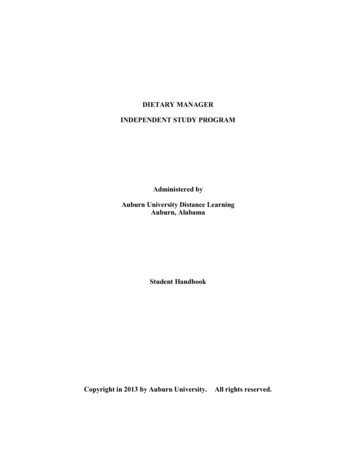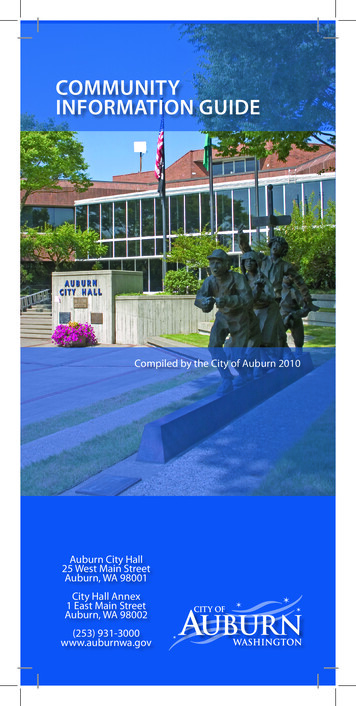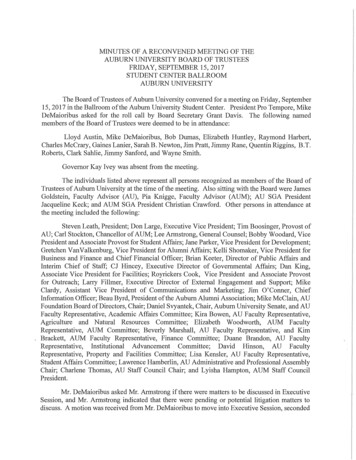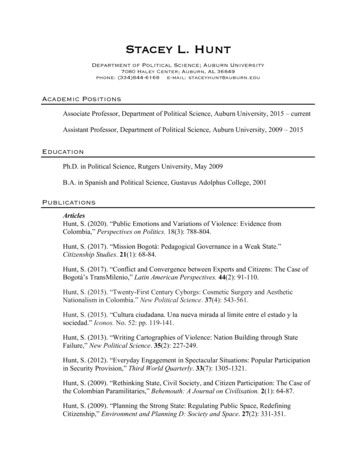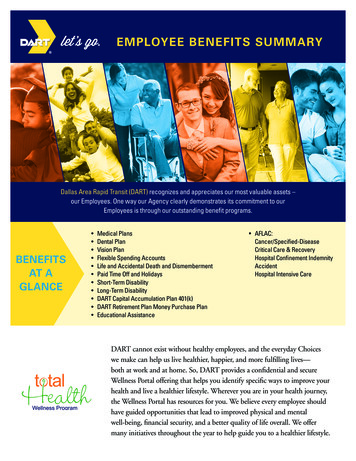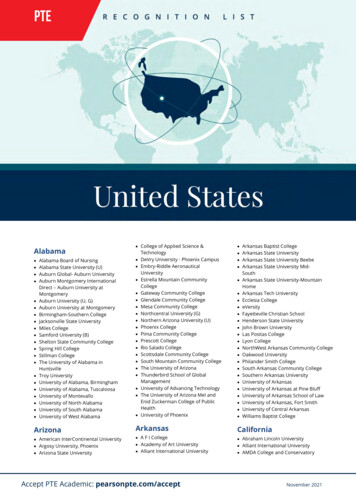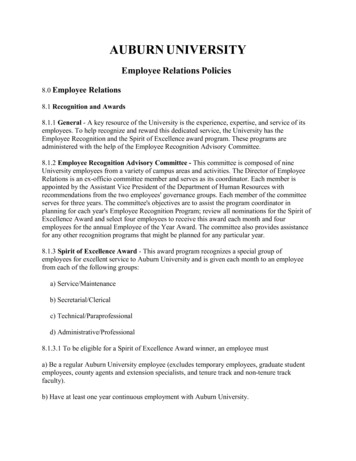
Transcription
AUBURN UNIVERSITYEmployee Relations Policies8.0 Employee Relations8.1 Recognition and Awards8.1.1 General - A key resource of the University is the experience, expertise, and service of itsemployees. To help recognize and reward this dedicated service, the University has theEmployee Recognition and the Spirit of Excellence award program. These programs areadministered with the help of the Employee Recognition Advisory Committee.8.1.2 Employee Recognition Advisory Committee - This committee is composed of nineUniversity employees from a variety of campus areas and activities. The Director of EmployeeRelations is an ex-officio committee member and serves as its coordinator. Each member isappointed by the Assistant Vice President of the Department of Human Resources withrecommendations from the two employees' governance groups. Each member of the committeeserves for three years. The committee's objectives are to assist the program coordinator inplanning for each year's Employee Recognition Program; review all nominations for the Spirit ofExcellence Award and select four employees to receive this award each month and fouremployees for the annual Employee of the Year Award. The committee also provides assistancefor any other recognition programs that might be planned for any particular year.8.1.3 Spirit of Excellence Award - This award program recognizes a special group ofemployees for excellent service to Auburn University and is given each month to an employeefrom each of the following groups:a) Service/Maintenanceb) Secretarial/Clericalc) Technical/Paraprofessionald) Administrative/Professional8.1.3.1 To be eligible for a Spirit of Excellence Award winner, an employee musta) Be a regular Auburn University employee (excludes temporary employees, graduate studentemployees, county agents and extension specialists, and tenure track and non-tenure trackfaculty).b) Have at least one year continuous employment with Auburn University.
c) Have a satisfactory performance evaluation rating at the time of nomination.8.1.3.2 Employees may be nominated for these awards by any regular Auburn University employee,including University faculty and are not limited to an employee's area of employment. In order tonominate an employee, a nomination form must be completed and sent to the Employee RecognitionAdvisory Committee, c/o the Department of Human Resources. Nominations must be received by the15th of each month.8.1.3.3 The Employee Recognition Committee will select an employee from each of the fouremployee groups based on the employee meeting one or more of these criteria:a) Performs "beyond the call of duty" to improve service, quality, and the department's or theunit's image.b) Exemplifies professionalism and dedication to excellent service by putting forth extra effort.c) Makes outstanding contributions of significance to the University or department's effort tofulfill its mission.d) Specific or sustained accomplishments that exceed normal expectations.e) Outstanding business contributions of significance based on initiative, cooperation, and theability to bring a job to a successful conclusion.8.1.3.4 An employee selected as a Spirit of Excellence Award winner cannot be nominated againprior to the annual University-wide Employee Recognition Award ceremony. Each monthly winner ofthe Spirit of Excellence Award will be eligible to receive the Employee of the Year Award. Thehonorees will be announced and recognized at the annual Employee Recognition Award ceremonyheld in the spring of each year.8.1.4 Employee Recognition Award Program - This award program recognizes employees foryears of service to the University. Employees receive these awards based on years of service:Years/Service Award5 Pin10 Pin20 Pin25 Clock30 Watch40 Chair8.1.4.1 In order to receive an award in any particular year, the employee must have completed theappropriate years of service by December 31, of the year prior to the award ceremony. Honoreeswill be recognized for total years of service. Time worked before a break in service will be countedtoward the total. Employees receive these awards for the years of service indicated.
8.1.4.2 Retirees will also be recognized during the award ceremony. Eligible retirees are thoseemployees who qualify for retirement from Auburn University having ten or more years ofcreditable service and having reached 60 years of age. There are no restrictions on age of retirementfor employees who are retiring with 25 or more years of creditable service.8.2 Employee Assistance Program (EAP)8.2.1 Introduction - Auburn University's largest investment and most valuable resources are itspeople. The goal of our Employee Assistance Program is to preserve and protect this valuableresource. A wide range of personal problems, not directly associated with one's position ofresponsibility, can adversely affect an employee's job performance. In most instances, the employeewill overcome such personal problems independently, and the effect on job performance will beminimal. In other instances, normal supervisory assistance will serve either as motivation or guidanceto resolve such problems, and the employee's job performance will return to an acceptable level.Sometimes, however, neither the employee nor the supervisor can resolve the employee's problem,and unsatisfactory performance exists.8.2.2 Purpose - Auburn University recognizes that most human problems can be successfully treatedor resolved, if identified early, and appropriate action or care provided. Such is the case whether theproblem is emotional, marital or family, legal, financial, alcohol or drug related, or any otherundetected behavioral/medical problem. The purpose of the Employee Assistance Program is toassure employees that if such personal problems are the cause of deteriorating job performance, theemployees will receive an offer of assistance to help resolve such problems in an effective andconfidential manner.8.2.2.1 An important concern of the Employee Assistance Program is to help the employee withalcohol and drug-related problems. Auburn University recognizes alcoholism and drug abuse asillnesses which can be successfully treated. Thus, employees with these illnesses can expect to receivethe same consideration and opportunities for treatment that are extended to employees with any otherillness or health problem.8.2.3 Guidelines - Auburn University believes that one of the basic functions at all levels ofsupervision is to identify below standard job performance and take the necessary steps to help theemployee improve his or her performance. All supervisors are responsible for the effective adoptionand implementation of this policy in their departments or units. In such situations the propersupervisory action is to refer the troubled employee, on the basis of deteriorating job performanceonly, to the EAP Coordinator who will, if necessary, refer the employee for appropriate consultation.However, the cause of below standard job performance may well be outside the realm of jobresponsibilities when the employee is unable or unwilling to correct the situation on his or her ownor with normal supervisory assistance.8.2.3.1 Auburn University becomes involved with an employee's behavioral, medical, and otherpersonal problems only when the problems affect job performance, attendance, safety, conduct, andproductivity. There is no wish or intent to intrude upon the private or personal life of an employeebut rather to provide assistance where needed for his or her success.
8.2.3.2 Some employees may have problems that have not yet progressed to the point ofseriously affecting job performance. Any employee who recognizes such problems mayvoluntarily contact the EAP Coordinator for confidential help.8.2.3.3 An employee's job performance may be affected when a family member is troubled. For thisreason, Auburn University extends the same offer of assistance, through the employee, to immediatefamily members.8.2.3.4 Participation in Auburn University's EAP is voluntary to the extent that the employee will notbe forced to participate in or accept recommended treatment. Refusing an offer to participate in theEmployee Assistance Program will not be a basis for disciplinary actions and will not, in itself, beused against the employee. If the employee fails to follow recommendations, normal existingdisciplinary action based on documented job performance will be taken.8.2.3.5 Employees are responsible for the costs involved in resolving or treating any personalproblem just as they are presently responsible for any costs for hospitalization or medical services.Auburn University's group health and hospital insurance coverage may cover all or a percentage ofthe cost of services of health care professional (including alcoholism and drug abuse treatment) towhom employees and their eligible dependents may be referred for assistance.8.2.3.6 If the problem is not covered by health insurance, the EAP Coordinator will inform theemployee in advance and work with the employee to locate other resources to provide assistance ifneeded.8.2.3.7 Confidentiality - Referral for evaluation or acceptance of suggested treatment will in no wayjeopardize an employee's job security or promotion opportunities. An individual's participation in theprogram will remain totally confidential and will not be made part of his or her personnel records.Medical and insurance records, if any, will be preserved in the same confidential manner as all othermedical records. Program participation records will be maintained separately and independently ofany other files, for the program staff's use only.8.3 Employee Conduct and Job Rules8.3.1 General - Auburn University's rules concerning employee conduct and job performance aresimple, common-sense guidelines applicable to all categories of employees, includingAdministrative/Professional, Staff, and Faculty. They are necessary to ensure that all employees canwork in an orderly, efficient, economical manner, free from disturbances which hinder job training,job production, and job enjoyment. It is the full responsibility of each employee to know whatUniversity and departmental rules and regulations do exist and to observe them at all times.8.3.2 Classification of Rules And Regulations - Rules and regulations are classified by degree ofseverity so that corrective action can be consistently administered. The classifications of severity andthe rules are intended as general guidelines to good judgment and fair treatment. Rules are notrestricted to those listed, for some are covered by specific departmental regulations which will bediscussed with the employee by the supervisor. Employees shall know and understand what theseother regulations contain as well as the general conduct and job performance rules listed here.
8.3.3 Group I - Employees found in violation of these rules and regulations will be subject toimmediate discharge:a. Intimidating or intentionally imposing on the rights and privileges of other employees.b. On University property, drinking intoxicants or using drugs particularly when there may be anadverse effect or danger to other employees.c. Changing or otherwise falsifying or forging any University records, permits, time cards or timesheets, licenses, certifications, passes, badges, or the approving signatures thereon.d. Indulging in grossly offensive, obscene, or immoral conduct.e. Deliberately restricting production output and/or University operations or concealingdefective work.f. Stealing or misappropriating University property or property belonging to otheremployees.g. Intentionally defacing or damaging University property or the property of otheremployees.h. Fighting on University property or creating disturbances which adversely affect morale,production, studies, or discipline.i. Any other actions not listed in a-h above but considered by the University as constitutingmajor misconduct, insubordination, gross negligence, or gross disregard of obligation to theUniversity. Such actions will include violation of another employee's protection againstdiscrimination or harassment as set out in the Equal Opportunity Affirmative Action Policy ofAuburn University.8.3.3.1 Note: Under certain circumstances, being convicted of a criminal offense outside of theUniversity could lead to discharge. Specific action will be determined by the nature of the offenseand the employee's job performance.8.3.4 Group II - Employees found guilty of these actions, except where the circumstances areextremely aggravated, will be given a last Formal Written Reprimand which will show that anyrepetition of the violation or further violation of University rules, generally within six months, couldresult in discharge. Such written reprimands will be posted to the employee's individual record.a. Sleeping while on duty during working hours.b. Continually or intentionally disregarding any appropriate departmental or University rules.c. Reporting to work under the influence of intoxicants, narcotics, or drugs particularly whenthere may be an adverse effect or danger to other employees.d. Refusing to obey reasonable and necessary orders or job assignments or using abusive orthreatening language.e. Indulging in horseplay or malicious mischief in any form.f. Smoking in nonsmoking areas or disregarding any University security or fire regulations.g. Leaving University premises prior to the end of any normal work period without prior noticeor approval.h. Failing to return to work at the end of an authorized leave period unless supervision has beenadvised of the reason for delay.
8.3.5 Group III - Employees who are guilty of these actions listed, except where circumstances areextremely aggravated, will be (in order and as repeated violations occur)a. Given an oral reprimand.b. Given a written formal reprimand.c. Given a last formal reprimand showing the employee was advised that future offenses couldbe subject to demotion, suspension or discharge.8.3.5.1 These actions are:a.b.c.d.e.f.g.h.i.j.Failing to immediately report to the employee's supervisor all injuries or illnessesoccurring at work.Continually disregarding normal safe work practices.Contributing to poor housekeeping or unsanitary conditions.Practicing poor personal hygiene.Distracting or annoying other employees while they are performing assigned duties.Damaging University property and equipment through improper use or lack of care.Abusing sick leave privileges.Failing to notify the employee's supervisor each day of any absence from scheduled work.Failing to comply with a department’s dress policy.Having continued absences or tardiness from scheduled work for which the reasons forabsence or tardiness are not considered valid.8.3.5.2 Note: Employees serving in their probationary periods of initial employment or reemployment are considered to be on a trial basis, and they could be formally disciplined and/ordischarged for any conduct or job performance rule violation during this probationary period. Theyalso do not have a right of appeal except for grievances pertaining to instances ofdiscrimination or harassment based on race, color, religion, sex, age, disability, nationalorigin, or veteran’s status.8.4 Progressive Disciplinary Procedures8.4.1 Auburn University encourages open and informal discussion of complaints and problemsbetween supervisors and employees. Supervisors should encourage employees to discuss theircomplaints and problems with them. When a conflict between supervisors and employees cannot beresolved through normal channels, one or both parties may seek resolution and advice from theDepartment of Human Resources. Employees also have access to the employee grievance processcontained in sections 8.6 (Administrative/Professional) or 8.7 (University Staff).8.4.2 The supervisor is responsible for establishing and maintaining a work environment whereemployees can improve their job performance. The supervisor's continuing emphasis on developingcorrect work habits through effective orientation, training, and performance review and on regularand meaningful communication is essential in contributing to the productivity and well-being ofemployees and developing good employee/management relations.
8.4.3 Disciplinary action should be corrective rather than punitive. A series of disciplinary actionsmay result in dismissal, unless dismissal is the result of a major act of misconduct. The kind ofcorrective action initiated by the supervisor depends upon the severity of the situation. Whereverpossible, counseling should be used before formal corrective action is taken.8.4.4 The supervisor needs to ensure that employees under his or her supervision have beeninformed in advance of poor performance or bad job conduct, so that if an occasion occurs thatrequires corrective action, there should be less of a chance for any misunderstanding on theemployee's part concerning the action taken.8.4.5 Before determining what form of corrective action to take, a supervisor should follow theseprocedures for progressive discipline:a) Identify the job performance problem and discuss it with the employee as soon as possible; and usediscretion: One single incident may not necessitate action, but deviation from acceptable jobperformance patterns should be identified early.b) Be specific in describing the performance problem; make sure the employee understands exactlywhere he or she needs to improve and to what extent; and explain the consequences of continuedjob performance deterioration.c) Keep discussions focused on job performance problems and keep emotions in check.d) When reprimands are given, ask the employee what action he or she will take to solve theproblem: Follow-up discussions should determine whether the employee is actually taking action,particularly in cases where the performance continues to deteriorate. The supervisor may use his orher discretion in deciding how direct to be in these matters.e) Avoid diagnosing personal problems as causes of unsatisfactory job performance; and leavediagnosis to the professionals who are qualified to conduct assessments and provide referrals.f) If a relapse occurs, treat it on an individual basis, depending upon the employee's progress andattitude.g) In cases of dismissal, make sure the employee has a pre-termination hearing in order that they maygive their side of the situation.8.4.6 Informal Private Discussion of the Problem with the Employeea) Review the problem (attendance, job performance, general behavior, etc.) with the employee; listento the employee since there may be mitigating circumstances of which the supervisor is unaware, andbe sure that the employee understands what is expected of him or her and point out your expectationsin order to gain understanding.b) Inform the employee of the Employee Assistance Program for self-referral if a need forassistance is indicated. See section 8.2.c) Document the discussion for future reference, to include Employee Assistance Program
advisement and availability; emphasize to the employee that confidentiality will be maintained andthat the Employee Assistance Program is strictly voluntary; and keep the documentation in yourpersonal file if needed for future reference.d) If improvement occurs, advise the employee accordingly.8.4.7 Written Reprimanda) Review the problem with the employee and make sure that he or she understands that theaction is taken because of unsatisfactory job performance or workplace behavior.b) Inform the employee of the Employee Assistance Program for referral if needed.c) Review what is expected of the employee and why; explain to the employee why his or herperformance is unsatisfactory or below required standards; and offer suggestions and set goals forimprovement.d) Document the discussion to include Employee Assistance Program advisement and availability;furnish a written copy of the reprimand to the employee within one week covering the pointsdiscussed during the meeting; ensure that the statement includes the fact that the employee wasadvised that an Employment Assistance Program is available, if the employee desires assistance; askthe employee to sign the reprimand: The employee's signature does not necessarily mean agreementwith the reprimand, but that the employee is aware of it; and send a signed copy of the reprimand tothe Department of Human Resources to be placed in the employee's file.e) Establish a follow-up date to review progress with the employee and document whether steps haveor have not been taken toward correction. The appropriate time frame will vary with each employee,depending on his or her abilities and the severity of the problem.Note: It is important in these first two steps to encourage the employee to give his or her views on theperformance problem in order to avoid any misunderstandings. The supervisor should encourage theemployee to acknowledge that there is a current job performance problem on his or her own or withnormal supervisory guidance. The supervisor should not assume that personal problems are the causeof low performance, nor should the supervisor attempt to diagnose such problems. If the employeeadmits to a personal problem, the supervisor should ask whether the employee would like to discussthe problem with a counselor, either by self-referral or an EAP arranged appointment.8.4.8 Form – The corrective action form can be found on the Human Resources website.8.4.9 Written Final Reprimanda) If the problem is not corrected, issue a written final reprimand to the employee; make sure theemployee understands the significance of the written reprimand and why he or she is receiving one;ask the employee to sign the reprimand and send a signed copy of the reprimand to the Department ofHuman Resources to be placed in the employee's file.b) If there is a need, offer the assistance of the Employee Assistance Program.
c) The written final reprimand must outline steps for improvement of the employee's workperformance and state that without significant improvement, action for dismissal, demotion, orsuspension will be taken.d) Establish a follow-up date; and review progress with the employee on the established date anddocument that progress or the lack thereof.8.4.10 Job Action - If previous steps have not resulted in improved job performance, specificaction should be taken. It may take one of the these forms:a) Suspension - Occurs when an employee is not allowed to work for a specific period of time. This isusually without pay. However, there are times when an investigation of an employee is alleged wrongdoing is needed, and in these cases the employee may be suspended with pay until the investigation iscompleted and a decision is made.b) Demotion - May be appropriate when an employee is otherwise in good standing but is in a jobfor which he or she is not qualified to perform. It may also occur as part of the result of correctiveaction that is taken against an employee. A demotion results in a downgrade in classification and/orpay.c) Dismissal - Occurs when an employee is relieved of his or her duties as an employee of theUniversity. Dismissals should be closely coordinated with the Department of Human Resources andthe appropriate Dean, Director, Department Head or Vice President before termination of anemployee is completed8.4.11 An employee who receives formal written reprimand, or is suspended or discharged, has fullrecourse through the appropriate University Administrative/Professional or University Staff grievanceprocedures, found in sections 8.6 and 8.7, respectfully.8.4.12 Individual counseling and corrective actions are necessary motivating steps for employees toimprove their conduct or job performance. It is equally important that full recognition be given toemployees who do make real and successful efforts to correct their deficiencies.8.5 Involuntary Terminations - Auburn University reserves the right to manage its workforce asstated in section 1.1.3. However, consistent with sound management practices, employees aregenerally only subject to discipline or dismissal for cause. Each individual case for dismissal will beevaluated on its own set of circumstances. Proper procedures for dismissing an employee from theUniversity are essential to ensure that any employee's rights are protected. This protection isaccomplished through an appropriate hearing which is conducted to ensure that the employee'sposition is heard and evaluated by supervision before any final decision is made. The following stepswill be taken prior to making a decision of dismissal.a) The employee will be advised that he or she has allegedly committed a serious violation ofUniversity work rules and that the circumstances are being reviewed. The employee will beprovided an approximate time for the review to be completed.b) Upon completion of the review, the employee and the supervisor will establish a time for a
conference. During the conference, the details of the rule violation will be explained to theemployee, and the employee will be given an opportunity to explain his or her action and to presentevidence in addition to his or her own statements. At the conclusion of this meeting, the supervisorwill establish the time by which he or she will reach a final decision on this matter.c) If the decision is one of dismissal, the supervisor will inform the employee of that decision andof his or her rights to appeal that decision through the respective grievance procedure.8.5.1 Pre-termination hearings and dismissals will be coordinated through the Department ofHuman Resources and the appropriate Dean, Director, Department Head or Vice President.8.5.2 Categories for Involuntary Termination There are three categories for involuntarytermination of employment from Auburn University:a) Termination for Cause with Immediate Discharge - Rules for general conduct and jobperformance are listed in section 8.3. Employees committing Group I actions will be subject toimmediate discharge from Auburn University and will not be eligible for reemployment.b) Termination with Notice - Employees may be terminated with notice for reasons related tosubstandard performance or for inappropriate job behavior. For substandard performance, thesupervisors must have a record of appropriate employee counseling; and for inappropriate jobbehavior, the supervisor will have exercised the four steps of the progressive discipline procedure.8.5.3 Reduction in Force/Layoff icies/Policies/ReductionInForceLayoffPolicy.pdf8.6 Administrative & Professional and University Staff Grievance Procedures8.6.1 Purpose: To set forth a procedure for the resolution of grievances for University Staff andAdministrative & Professional employees at Auburn University.8.6.2 DefinitionsEmployee: Refers to a non-faculty individual (exempt or non-exempt) currently employed by theUniversity who has completed his/her probationary period.Grievance: A grievance is an allegation by an employee that there has been a violation,misinterpretation, misapplication, or unreasonable application of a University policy, procedure,rule, or regulation regarding the employee’s employment conditions.Grievance Committee: A committee of the employee’s peers formed to assist employees in theresolution of employment related conflicts.Grievance Hearing Panel: A subset of the Grievance Committee selected to review and makerecommendations for the resolution of a specific employee grievance.8.6.3 General Policy
A staff, administrative, or professional employee who is seeking a solution concerning adisagreement, constituting a grievance, as defined in paragraph 8.6.2 above, may seek such aresolution using this policy.Employees who feel they are being discriminated against because of race, color, sex, national origin,religion, age, veteran’s status, or disability should immediately and directly take the issue to theOffice of Affirmative Action/EEO which can be reached at (334) 844-4794 or via the web athttp://www.auburn.edu/administration/aaeeo/While the University recognizes the employee’s right to file a grievance, the employee must discusshis/her concerns with the immediate supervisor and/or department head before filing a grievance. Ifthe immediate supervisor is alleged cause of the grievance, the grievant will take the concern to thenext level of management. Experience shows that most concerns can be resolved informally at thesupervisory level without the need for a formal grievance. The Human Resources Office providesmediation services to assist an employee in resolution of a problem or conflict.Grievances based upon the termination of a non-probationary employee or the significant orcontinued reduction of pay as a result of disciplinary action qualify automatically for a hearing if atimely request is made by the grievant.The grievance process is not a formal court proceeding, but is a peer review process for employeesto resolve grievances.8.6.4 Pre-grievance MediationDisputes between employees and supervision that are not settled through discussions betweenmanagement or the Human Resources Department can be submitted to mediation. Management or theemployee can request mediation. Either party can request mediation by notifying the HumanResources Department of their willingness to mediate. Mediation is a less formal means of settlingdisputes and is strongly encouraged as an alternative to filing a grievance. Both parties must agree tomediate, otherwise the process cannot proceed. Either party must notify the Human ResourcesDepartment within fifteen working days from the occurrence of the dispute of their intent to mediate.Human Resources will provide access to trained mediators available to facilitate the process. If youneed assistance, please contact Human Resources at 844-4145.8.6.5 FormCopies of the official Auburn University Grievance Form are available from the Hum
Employee Relations Policies 8.0 Employee Relations 8.1 Recognition and Awards 8.1.1 General - A key resource of the University is the experience, expertise, and service of its employees. To help recognize and reward this dedicated service, the University has the Employee Recognition and the Spirit of Excellence award program. These programs are

